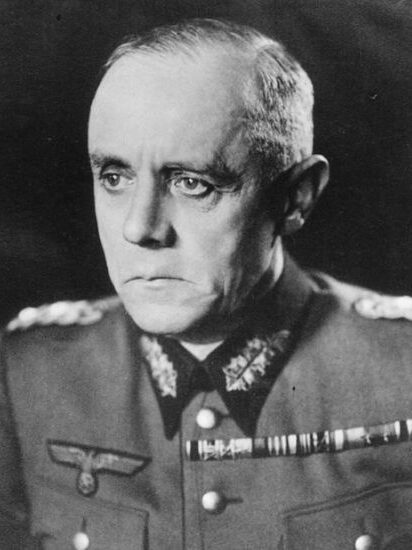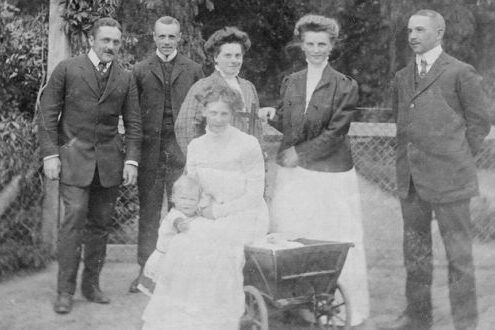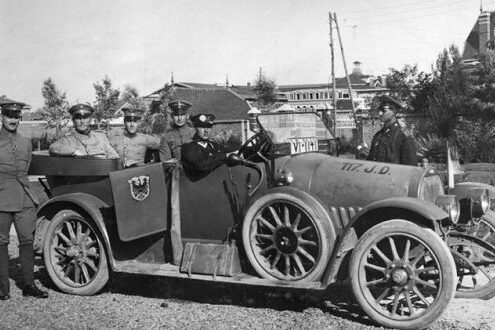Beck, Ludwig August Theodor
Colonel General, resistance fighter
Beck, Ludwig August Theodor
Born: June 29, 1880 in Biebrich am Rhein
Died: July 20, 1944 in Berlin
Ludwig Beck, son of the factory owner and owner of Rheinhütte, Ludwig Beck, graduated from the Humanist Gymnasium in Wiesbaden in 1898. He wanted to become an officer. On March 12, 1898, Beck joined the Prussian Field Artillery Regiment No. 15 in Strasbourg as an ensign. Even at the beginning of his career, he stood out for his sense of duty. As early as 1908, he was able to attend the War Academy in Berlin, after which he was transferred to the General Staff. During the First World War, Beck was deployed exclusively on the Western Front. The military collapse and the end of the German Empire in 1918 hit him particularly hard and plunged him into a personal crisis, especially as his young wife Amalie, née Pagenstecher, had also died in 1917 giving birth to a daughter.
Ludwig Beck was transferred to the 100,000-man army of the Weimar Republic and held various command positions. His career alternated between military service and general staff work. After the so-called "seizure of power" by the National Socialists, Beck welcomed Hitler's government program, in particular the revision of the Treaty of Versailles. He supported the development of the German army and advocated the creation of a modern, powerful army. Beck made a career for himself. On October 1, 1933, he was appointed Chief of the Troops Office in the Army Command of the Reichswehr Ministry, a title that was changed to Chief of the Army General Staff in 1935. In this position, he was responsible for the operational preparation and command of a land war.
This is also where Beck's change from a purely military to a responsible, civic mindset took place. Several stages along the way were responsible for this change. It began with the so-called Röhm Putsch of June 30, 1934, in which Hitler had generals Kurt von Schleicher and Kurt von Bredow, among others, murdered in cold blood alongside the leadership of the SA. Beck was particularly outraged by the lack of reaction from the other generals of the Wehrmacht after the murders. The swearing-in of the Reichswehr to Hitler personally after the death of Reich President Paul von Hindenburg on August 2, 1934 was a further step. Now the Reichswehr was no longer bound by the constitution, but only directly to Hitler. Beck described the day as the "darkest day of his life" and wanted to resign. He was held back by the argument that no one outside the army would understand such a move.
Hitler's announcement on 5.11.1937 that he wanted to solve the German question in Europe by force shook him deeply, as he had to realize that he wanted to misuse the Wehrmacht for a war. However, it was only after Hitler's statement in May 1938 that he wanted to smash Czechoslovakia through military action that Beck reacted. In his opinion, this could only mean war, for which Germany was not equipped. In his position, he did not want to be responsible for "any National Socialist war adventures".
In three major memoranda, he pointed out the dangers of a future war that could ultimately only mean the destruction of Germany. He clearly set out the consequences in order to prevent Hitler from realizing his war plans. When Hitler finally forbade these undesirable interventions and Beck felt that he had no support in the General Corps, he handed in his resignation. After his resignation, Beck remained in Berlin. He occupied himself intensively with military history studies. Gradually, he became involved in resistance circles. He succeeded in establishing links between the civilian opposition and the military resistance. He was described by everyone as the "head" of the resistance movement and was to become head of state in a future new government. The "uprising of conscience" failed, the assassination attempt on Hitler on July 20, 1944 failed. Beck himself was arrested that very night in the Bendlerblock in Berlin. While the co-conspirators around Colonel Claus Graf Schenk von Stauffenberg were shot in the courtyard, he was given the opportunity to commit suicide, but two attempts failed. In the end, the seriously injured man was shot by a sergeant. An elementary school in Wiesbaden is named after him. The city has also awarded the Ludwig Beck Prize for Civil Courage since 2004.
Literature
- Faber, Rolf
Colonel General Ludwig Beck - his path into the resistance. In: Riedle, Peter Joachim (ed.): Wiesbaden und der 20. Juli 1944. Contributions by Gerhard Beier, Lothar Bembenek, Rolf Faber, Peter M. Kaiser and Axel Ulrich. Publications of the Wiesbaden City Archive, Volume 5, Wiesbaden 1996 (pp. 63-81).
- Faber, Rolf
Ludwig Beck's military library in Hamburg. A biographical-bibliographical discovery. In: Stahl, Günter (ed.): Herbstlaub. Summer-Autumn-Anthology 2004, Offenbach am Main 2004 (pp. 29-35).


